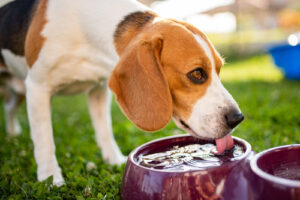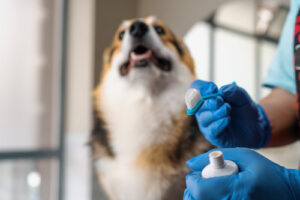Did you know dogs can get ulcers, just like humans can? If your dog has been having trouble with her stomach lately, there’s always a chance she could have an ulcer. Learning how to recognize signs of ulcers in dogs can help you get a head start on taking care of this problem.
In our Houston, TX, animal hospital‘s article below, you’ll find a quick list of some of the most common symptoms of ulcers in dogs. Read through this list and see if your dog seems to be showing these signs. If so, it may be time to talk to your vet for more information about your pet’s health and wellness.
Black and Tarry Stool
Black and tarry stool is a concerning symptom that happens when there is bleeding high up in the digestive system. If your dog’s ulcer is located in the upper parts of the digestive tract, then it could quickly lead to this symptom.
If you notice black and tarry stool, this is a sign that your dog needs help fast. Go to the vet as soon as possible for diagnosis and a treatment plan. Remember, too, that bright red blood in the stool typically does not indicate an ulcer, although it is often a sign that your dog has hemorrhoids instead.
Vomiting
Vomiting occurs frequently in dogs with stomach ulcers. In fact, excessive vomiting is one of the most common signs of this problem. Most of the time, dogs with ulcers will vomit blood as well as bile, and there may or may not also be stool in the vomit.
Vomiting blood can indicate other serious conditions too, but ulcers are one of the more common causes of this scary symptom. If your dog vomits more than a couple of times in a day or has vomit with blood in it, go to the emergency vet, as this could be a sign of a serious problem.
Loss of Energy and Appetite
Loss of energy and loss of appetite are common symptoms of all sorts of canine health problems. On their own, these symptoms cannot indicate an ulcer specifically, but they can let you know something is wrong with your pet.
If you notice these symptoms along with others listed here, however, then this is a good sign that your pet probably has an ulcer. No matter what the underlying cause, it’s important to resolve any issue that’s causing loss of energy and appetite in your dog.
Paleness of the Gums
Paleness of the gums typically indicates dehydration or lack of oxygen in the body. This is a symptom that goes along with a wide range of problems, and it isn’t only related to ulcers. However, it can happen if your dog has a stomach ulcer that is leading to dehydration.
If your dog’s gums lose their normal color for longer than a day, this is an indication that they should be seen by a vet as soon as possible. Unless they have other, more severe symptoms from this list or you suspect they are severely dehydrated, they do not necessarily have to see an emergency vet.
Dehydration
Dehydration is one of the most concerning symptoms of stomach ulcers. If left untreated for too long, dehydration can even be fatal in some dogs. When dogs are dehydrated, they slowly lose physical abilities, and their organs may eventually stop functioning properly.
If your dog is experiencing mild dehydration, you may be able to reverse the issue on your own at home by providing extra water or feeding wet food. However, moderate to severe dehydration should be treated with the help of your vet. Very severe dehydration will require a trip to the emergency vet.
Abdominal Guarding
Dogs who have a lot of stomach or abdominal pain may guard this part of the body. This means that your dog will be unwilling to let you pet their stomach or even get too close to touch it.
If you notice your dog avoiding contact with their abdomen or sleeping in a tightly curled position all the time without changing, this may be a sign they have stomach pain. Stomach pain can be caused by several underlying issues, but ulcers are one of the possibilities. Talk to your vet for more information.
Although ulcers are not as common as some other potential health problems for dogs, they are not that uncommon, either. If you suspect your dog may have an ulcer, there’s a chance you could be right.
When In Doubt About Dog Ulcers, Come See Our Houston, TX, Vets
If you believe your pet is experiencing any of the above symptoms, bring your dog in for an exam. Our Houston, TX, veterinarians can diagnose an ulcer accurately and let you know the best option for treatment or management of the condition moving forward. To schedule a vet visit, give our animal hospital a call at (713) 526-5881.





